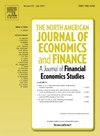媒体的关注如何揭示ESG改善的机会?基于多算法机器学习的台湾电子工业方法
IF 3.8
3区 经济学
Q1 BUSINESS, FINANCE
North American Journal of Economics and Finance
Pub Date : 2025-04-11
DOI:10.1016/j.najef.2025.102431
引用次数: 0
摘要
关于ESG(环境、社会、治理)问题的讨论浪潮广泛表明,ESG目标可以使公司受益,并为投资者提供相应的优势。然而,很少有研究考虑到ESG绩效可以提供的实际价值,导致对ESG投资的期望过高(Cornell &;Damodaran, 2020)。对ESG抱有较高期望的公司可能会在此类举措上过度投资。为了抵消这可能带来的潜在偏差,ESG评级机构可能会谨慎地调整其加权方法,以确保更准确的评估。由于利益相关者的关注点不同,ESG评分缺乏有说服力的改革建议,无法为企业改善ESG行动提供建议,降低了企业对ESG资源配置的积极性和信心。本研究采用Refinitiv新闻数据库和多算法机器学习方法,以台湾电子行业上市公司的ESG得分为目标。利用神经网络(NN)、支持向量机(SVM)学习和随机森林算法构建了一种基于多算法机器学习的方法来探索媒体注意力的预测能力。媒体关注正向影响台湾电子企业ESG综合得分;然而,对个别公司的影响并不一致。最后,结合叠加泛化模型,提高了ESG分析的预测精度;在研究样本中,支持向量机算法的贡献最为突出。本研究采用多算法机器学习方法,建立台湾电子上市公司ESG综合得分对媒体关注度影响的预测模型。实证结果表明,半监督学习和综合叠加泛化模型在企业社会责任研究中具有实际应用价值;探索企业在ESG投资配置上的不足,通过ESG管理决策者和资源配置为企业规划提供反馈。本研究提出了未来ESG研究的潜在方向,如采用半监督学习或支持向量机来改进研究方法。本文章由计算机程序翻译,如有差异,请以英文原文为准。
How can media attention reveal ESG improvement opportunities? A multi-algorithm machine learning-based approach for Taiwan’s electronics industry
The wave of discussions on ESG (environment, social, governance) issues widely suggest that ESG goals can benefit companies and provide corresponding advantages to investors. However, few studies consider the actual value that ESG performance can deliver, leading to overly high expectations regarding ESG investments (Cornell & Damodaran, 2020). Companies with high ESG expectations may overinvest in such initiatives. To counteract the potential biases this could introduce, ESG ratings agencies might discreetly adjust their weighting methods to ensure more accurate assessments. Owning to differing focal points among stakeholders, ESG scores lack persuasive reform suggestions for corporations to improve ESG actions, reducing corporate enthusiasm and confidence in ESG resource allocation. This study employs the Refinitiv news database and multi-algorithm machine learning methods to target the ESG scores of Taiwan-listed companies in the electronics industry. Neural networks (NN), support vector machine (SVM) learning, and random forest algorithms are used to construct a multi-algorithm machine learning-based approach to explore the predictive ability of media attention.
The results show that specific ESG practices of listed corporations in Taiwan’s electronics industry need to be strengthened, especially regarding CSR (corporate social responsibility) strategies and Human Rights. Media attention positively impacted the comprehensive ESG scores of companies in Taiwan’s electronics industry; however, the impact on individual companies was inconsistent. Finally, integrating stacked generalization models can improve the prediction accuracy of ESG analysis; the contribution of support vector machine algorithms was most prominent in the study sample.
This study uses multi-algorithm machine learning methods to establish a prediction model for the impact of the comprehensive ESG scores within Taiwan’s listed electronics industry on media attention. The empirical findings suggest the practical application value of the semi-supervised learning and integrated stacking generalization models for conducting ESG research; exploring enterprise shortcomings in ESG investment allocation provides feedback for enterprise planning via ESG management decision-makers and resource allocation. We recommend that listed corporations in Taiwan’s electronics industry prioritize issues related to Human Rights and Emissions Reduction when implementing future ESG actions. This study suggests potential directions for future ESG research, such as employing semi-supervised learning or support vector machines to enhance research methods.
求助全文
通过发布文献求助,成功后即可免费获取论文全文。
去求助
来源期刊
CiteScore
7.30
自引率
8.30%
发文量
168
期刊介绍:
The focus of the North-American Journal of Economics and Finance is on the economics of integration of goods, services, financial markets, at both regional and global levels with the role of economic policy in that process playing an important role. Both theoretical and empirical papers are welcome. Empirical and policy-related papers that rely on data and the experiences of countries outside North America are also welcome. Papers should offer concrete lessons about the ongoing process of globalization, or policy implications about how governments, domestic or international institutions, can improve the coordination of their activities. Empirical analysis should be capable of replication. Authors of accepted papers will be encouraged to supply data and computer programs.

 求助内容:
求助内容: 应助结果提醒方式:
应助结果提醒方式:


